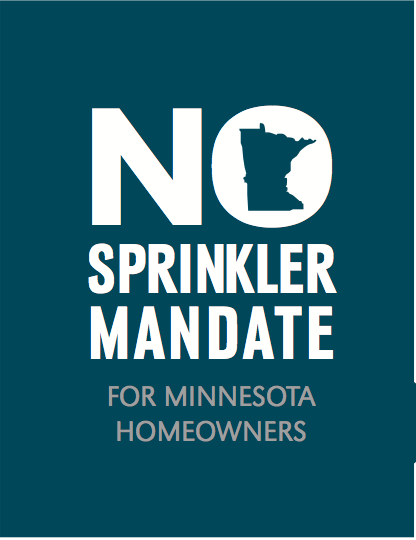The Builders Association of the Twin Cities (BATC), alongside the Builders Association of MN and other business groups strongly opposes the costly and unnecessary home indoor sprinkler mandate included in the draft of the updated residential building code released today by the Minnesota Department of Labor and Industry (DLI). The mandate would require home indoor sprinklers to be placed in all single-family homes that are 4,500 total square feet and above (including basements and other unfinished spaces).
The home indoor sprinkler mandate has been under discussion for several years, and BATC and other homebuilding, housing and business groups are in strong opposition to it as a costly and unnecessary government regulation that would negatively impact consumers and the housing industry. A bi-partisan, super-majority of legislators has twice sent bills to Governor Dayton attempting to block a sprinkler mandate in the code; both were vetoed. Additionally, the 2013 legislature, again with bi-partisan support, placed language in two different Omnibus bills near the conclusion of the legislative session to prohibit the mandate, only to have the provision removed from both. Finally, the DLI’s Residential Code Advisory Committee has twice overwhelmingly recommended that Minnesota not include a home indoor sprinkler system mandate in our state’s building code.
“It is deeply disappointing that Governor Dayton and the Department of Labor and Industry have chosen to ignore the opposition of the legislature, their own advisory committee, experts from the housing industry and other Minnesotans concerned about unnecessary government regulation,” said BATC President Pamela Belz. “This issue has been thoroughly vetted for years and the results are clear: newly built homes are a model for safety today. The case for an additional government rule mandating home indoor sprinklers in new homes does not justify the added costs for homebuyers.”
BATC estimates that a home indoor sprinkler system mandate would increase the cost of a new four bedroom, three bathroom home by at least $9,000. If the home uses private well water, as many communities in the Twin Cities and across the state still do, the added cost can rise to $13,000 or more once water pump and well improvements are considered. This cost does not include annual maintenance, higher property taxes, or the cost if the home indoor sprinkler system were to malfunction.
Marv McDaris, Division President of Pulte Homes and member of BATC’s Board of Directors agreed. “As homebuilders, we deal with regulations on a daily basis. We support most of them, but a home indoor sprinkler mandate is a costly, unnecessary government mandate that will not only add significant up-front costs to middle-class homeowners, but will be an ongoing cost and maintenance issue throughout the life of the home,” he said.
BATC is calling on Governor Dayton to remove this provision from the code.
“The Governor has talked about the upcoming ‘un-session,’ which will look at eliminating unnecessary or redundant laws, rules and regulations. We believe the home indoor sprinkler mandate fits this definition and should be removed from the code immediately,” Belz said.
-30-
The Builders Association of the Twin Cities is the leading voice for builders and remodelers. BATC represents 1,100 builders, remodelers, developers and industry suppliers with a mission of helping its members grow their businesses through marketing, advocacy and industry connections. BATC is widely recognized as a powerful force at the state Legislature and with state regulatory agencies. It’s also known for its twice-a-year signature events: The Parade of HomesSM and Remodelers Showcase®. In addition, BATC offers Minnesota’s Green Path, a growing new home and remodeling certification program providing healthy, durable, energy-efficient homes to buyers and homeowners.

